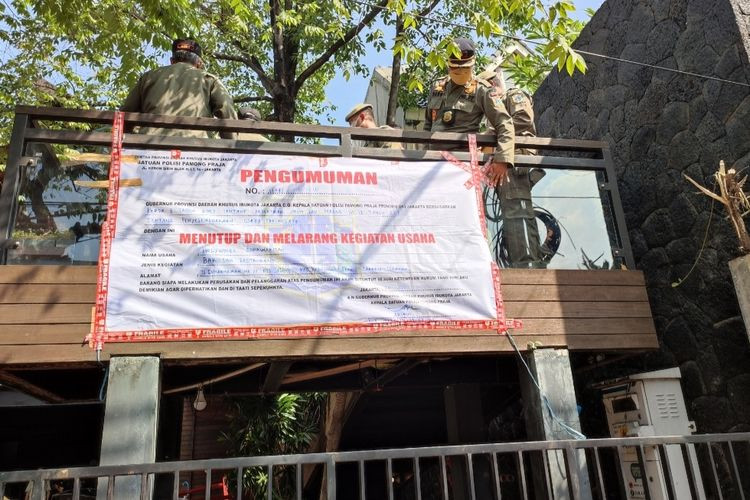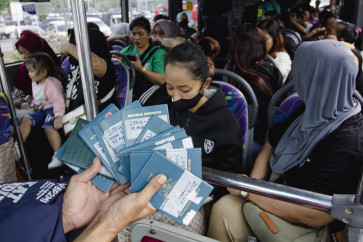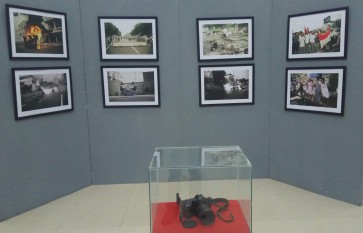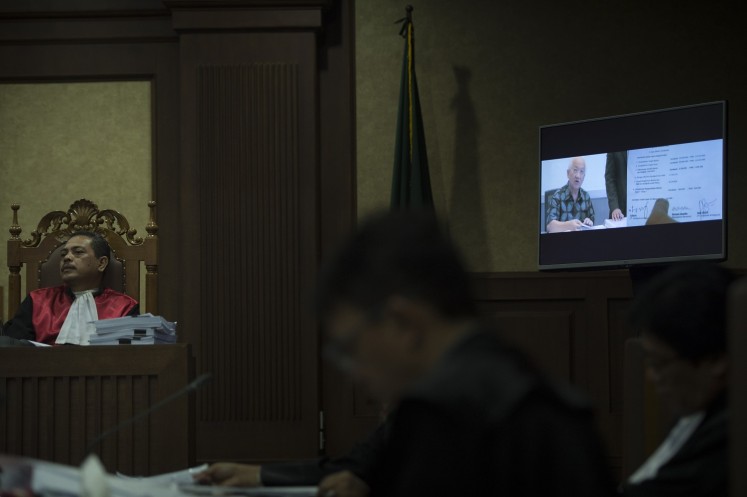Popular Reads
Top Results
Can't find what you're looking for?
View all search resultsPopular Reads
Top Results
Can't find what you're looking for?
View all search resultsHolywings case shows political appeal of conservatism persists
Both Ahok and Holywings share commonalities. Their controversies revived emotive politics on the basis of religious values and a complex calculation to reframe figures as the people’s enemy.
Change text size
Gift Premium Articles
to Anyone

C
onservatism has become a recurring theme in Indonesian public discourse. A couple of days ago, Jakarta Governor Anies Baswedan revoked the business permits for 12 Holywings outlets following the “Muhammad-Maria” controversy.
This decision was not a political surprise. In recent years, there has been a growing invocation of conservatism through religious symbols, particularly those of Islam, which is constantly maintained to appeal to the Muslim community as the biggest portion of potential voters in any election.
In this sense, we must view the act of Governor Anies as not only a sign of a belated state response but also a worrying trend in the persistent rise of conservative politics at the heart of the nation. More alarmingly, the issue of revoking the business permits has been conflated with the religious mission and a sacred war against a demonic business.
Although it showed a reactionary response, the governor’s act is “reasonable”, since Indonesia has struggled to calm its conservative tendency for years. The Holywings case reminds the public of the blasphemy conviction of former Jakarta governor Basuki “Ahok” Tjahaja Purnama, which now is considered a crucial checkpoint on the road of conservative politics.
Both Ahok and Holywings share commonalities. Their controversies revived emotive politics on the basis of religious values and a complex calculation to reframe figures as the people’s enemy.
With these backdrops, thus, I propose we look at the conservative streak from two perspectives. First, to examine the quasi-tyrannical Blasphemy Law, and second, to connect the overblown elites’ perception of the 2024 election.
The Holywings case has stoked another moral panic, as well as invoking the “morality police” to engage in cancel culture. However, the situation has worsened since innumerable people, groups and associations have started to report the bar industry for religious blasphemy.
Since the dramatic fall of Ahok in 2017, some scholars have noted that the Blasphemy Law allows state officials and vigilante groups to intimidate or engage in physical violence against “deviant”, individuals or groups who are perceived as insulting Islamic values.
Tyson (2021, 200) examined numerous political calculations behind Ahok’s blasphemy case, including the considerable pressure from a quasi-state institution, the Indonesian Ulema Council (MUI), and conservative and vigilante Muslims groups such as the Islam Defenders Front (FPI) through Aksi Bela Islam (Defend Islam Action).
With reference to the trial of Ahok, the blasphemy was recorded as being closely related to and politically motivated by political rivalries, significantly, it influenced the gubernatorial election result.
This configuration of actors can also be found in Telle’s work (2018), which explores the case of “religious deviants” in Lombok, West Nusa Tenggara. The protests and intimidation against certain deviants and, notably, minority figures were initiated by vigilante citizens and involved state officials who aggressively campaigned to prosecute any blasphemous act. More examples can be drawn from the Legal Aid Institute Foundation (YLBHI) reports of 67 blasphemy cases in 2020.
However, after two days of amok in the digital realms, Holywings, was not “officially” shut down under the Blasphemy Law but for violation of business permits (The Jakarta Post, June 28). This “coincidental” action between Holywings’ controversial promotion and its failure to obey the regulations can only be understood as an instrumentalization of the state’s power. It indicates a sleight of hand that allows the state to escape from engaging in blasphemy regulation and from the accusation of politicizing religious matters.
The trick is substantial for at least two reasons. First, the state needs a more pragmatic, simpler, but more robust approach to punishing without getting more deeply involved in religious debates. Second, using the Blasphemy Law is now less popular since this legislation is regarded as authoritarian in nature. It is also opposed by the majority of liberal urban-modern society, which undoubtedly is a significant portion of potential voters.
The conservative nature of society is a crucial factor that has accelerated the success of intolerance and which has encouraged people to side with right-wing and conservative politics. But again, politically speaking, invoking conservatism is intended to secure the orthodox Muslim base and preserve it for the election in 2024.
Many officials and political elites effectively align with the respective paramilitary factions and further play up their religiosity to gain support and win the favor of conservative constituencies. It is also no coincidence that Anies himself is highly involved in the upcoming presidential race, as many have reported, including pollsters and the media.
Under these circumstances, there is really no urgency to challenge the prevalent conservatism, considering its benefits in gaining mass sympathy and consolidating potential voters. As shown in the Holywings case, few of the political elite were critical of the decision but rather took sides against the company. Even some nationalist-oriented parties that stand on a pluralist platform and multicultural-based policies have seemed unsure in their comments and responses.
The Holywings controversy therefore might be considered a political indicator to map which actors deploy their power and use this discourse to generate mass support.
With this in mind, engaging more deeply in religious-based sentiment will more likely occur in the current political mindset. Ahead of 2024, the current use of the conservative formula as a proxy is unlikely to change.
***
The writer is a political researcher, University of Leeds, United Kingdom.









